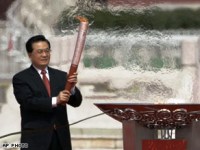8 Jul 2008 | News
London Metropolitan University has expressed ‘regret’ at offence caused to China by its recent award of an honorary doctorate to Tibetan religious leader the Dalai Lama in May.
A report on state-run China Daily said that the university’s vice-chancellor, Brian Roper, had sent a letter to China’s embassy in London on 16 June to apologise for any upset felt by the Chinese people over the award.
A spokeswoman for London Metropolitan said the move came after the university’s media monitoring service had noticed negative comment about the decision on Chinese websites.
However, a representative of the Chinese embassy in London confirmed to Index on Censorship that the letter of apology had come after the embassy had demanded it from the university.
Britain’s universities now hosts over 49,000 Chinese students.
15 Jun 2008 | Magazine, Volume 37.02 Summer 2008
[vc_row][vc_column width=”1/2″][vc_single_image image=”90659″ img_size=”full” onclick=”custom_link” link=”https://shop.exacteditions.com/gb/index-on-censorship”][/vc_column][vc_column width=”1/2″][vc_column_text]
Subscribe to Index on Censorship magazine on your Apple, Android or desktop device for just £17.99 a year. You’ll get access to the latest thought-provoking and award-winning issues of the magazine PLUS ten years of archived issues, including Made in China.
Subscribe now.[/vc_column_text][/vc_column][/vc_row]
7 May 2008 | Comment
 The estimated 30,000 journalists expected to converge on Beijing for the 2008 Olympiad need to prepare themselves well in advance before they blunder across one of the world’s least understood and most volatile domestic political stages, writes Rohan Jayasekera
The estimated 30,000 journalists expected to converge on Beijing for the 2008 Olympiad need to prepare themselves well in advance before they blunder across one of the world’s least understood and most volatile domestic political stages, writes Rohan Jayasekera
The XXIX Olympiad in Beijing will be covered by an expected 20,000 accredited sports media workers — and another 10,000 unaccredited. That’s more than three journalists for every athlete. How will China react to this influx of independent opinion if the focus comes off sport and on to politics?
January 2008 rules introduced for the Games theoretically allow foreign journalists to report freely on Chinese ‘politics, economy, society, and culture’ until next October.
This promised liberalisation came to a sharp halt following the outbreak of violent protests in the Tibetan capital of Lhasa on 10 March. Beijing responded with a news blackout, expelling foreign reporters from Beijing, Tibet and its neighbouring provinces of Gansu, Qinghai, and Sichuan.
The Foreign Correspondents Club of China has recorded more than 230 abuses of the new rules. Until March things were getting better, BBC World News Editor Jon Williams told a conclave of Chinese and Western journalists and media rights activists in Paris in April. ‘Now they’re as difficult as they’ve been for a long time.’
(more…)
15 Apr 2008 | Comment
 Would an Olympic boycott really inspire China to improve its human rights record and its dealings with Tibet? Or would it make things worse, asks Nick Young
Would an Olympic boycott really inspire China to improve its human rights record and its dealings with Tibet? Or would it make things worse, asks Nick Young
Tibet’s Himalayan neighbours in Bhutan and Nepal are beginning to build political institutions better fitted to the 21st century, and there is no doubt that Beijing should renegotiate its relationship with Lhasa in keeping with this zeitgeist.
But would an Olympics boycott advance this process or, indeed, advance human rights in China generally? Almost certainly not. Humiliating the government of China is, in this instance if not always, a less astute tactic than campaigners suppose, and is likely to prove counterproductive.
China expected the Olympics to signal the end of a long era of humiliation that began 170 years ago with the Opium Wars. By 2000 it seemed that China had at last emerged from the shadows of western bullying, Japanese invasion, civil war, internecine political struggle and failed development. The political elite saw hosting the Olympics as a celebration of this renaissance. They will take efforts to spoil the Games as a sign that, rather than being ready to accommodate China’s peaceful rise, the west is determined to slap China back down the development ladder.
(more…)


